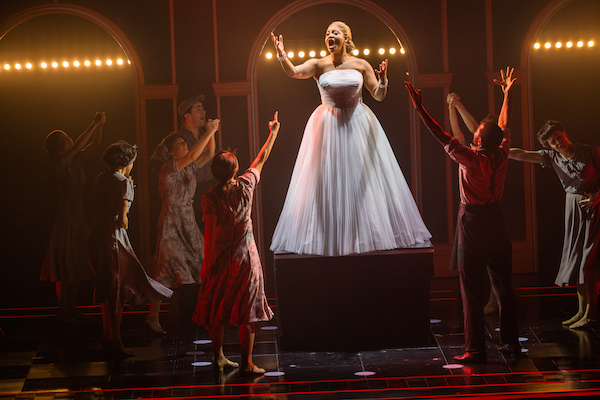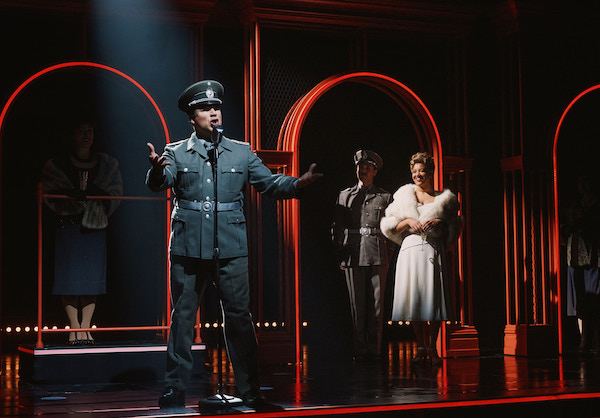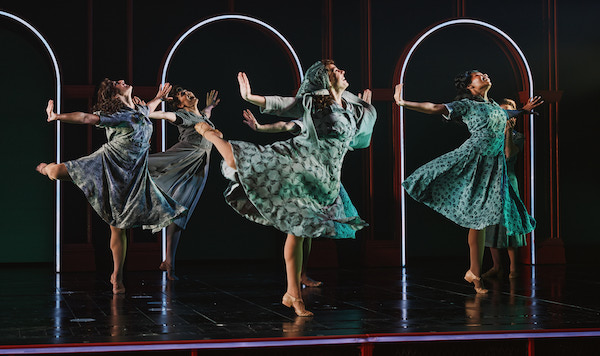Theater Review: “Evita” — Encouraging Signs
By David Greenham
This American Repertory Theater co-production gets so many of Evita‘s elements right — now all it needs is the musical’s combative soul.
Evita, lyrics by Tim Rice and music by Andrew Lloyd Webber. Directed by Sammi Cannold. Music direction by Mona Seyed-Bolorforosh. Choreography by Emily Maltby and Valeria Solomonoff. Scenic design by Jason Sherwood. Costume design by Alejo Vietti. Lighting design by Bradly King. Sound design by Connor Wang. Hair and wig design by Ashley Rae Callahan. Produced by American Repertory Theater in association with Shakespeare Theatre Company. Performed at the Loeb Drama Center, Cambridge, through July 30.

Shereen Pimentel (Eva) and members of the company of Evita at American Repertory Theater. Photo: Nile Scott Studio
The American Repertory Theater is rolling the dice again as it tries to run the table with another Broadway-bound revival of a hit musical. This time around it is Evita, the seminal Tim Rice/Andrew Lloyd Webber collaboration, which is more of an opera than a musical. That means Evita really ought to have wonderful singers and, for the first time in the brief history of the show’s major US productions, the ART/Shakespeare Theatre Company collaboration nails it.
Evita is notorious for its very challenging score. The original Broadway version starred — and made stars of — Patti LuPone and Mandy Patinkin. Still, despite earning seven Tony awards, the staging is remembered as a bit of a scream fest, especially because of the demanding musical range of the role of Eva.
Madonna tried to plow her way through the score in the troubled and mostly forgettable 1996 film adaptation. A 2012 Broadway revival placed the show on the shoulders of pop star Ricky Martin as Che, but that approach lost money. In 2019, New York City Center tried a version that split the role of Eva between two singers — a young Eva and an older one. That didn’t really work either.

Caesar Samayoa (Perón), Caleb Marshall-Villarreal, and Shereen Pimentel (Eva) in Evita at American Repertory Theater. Photo: Emilio Madrid
So, it’s bold that ART chose Evita as the next entrant on its conveyor belt of (hoped-for) hits on Broadway. The signs are encouraging: with some time to develop, this effort might reach the hallowed land. But there’s a hill to climb.
First the good news: Evita sounds and looks spectacular. Shereen Pimentel glimmers and glows as Eva. She handles the complexities of the score with surprising ease, including the Oscar-winning song “You Must Love Me,” which was added for the film. Thanks to Alejo Vietti’s costumes, Ashley Rae’s Callahan’s hair and wig design, and Amber Voner’s makeup, she’s as near to perfect an embodiment of Argentina’s legendary first lady as one could hope for.
What’s more, the entire production is packaged in Jason Sherwood’s sumptuous set and Bradly King’s exquisite lighting. Eva and the rest of the company are beautifully framed. The set and lighting design have been assembled to build to the epiphanic moment, when Eva sings “Don’t Cry For Me Argentina” among a tiered landscape of flowers and candles. It’s stunning.
Likewise, Caesar Samayoa brings a commanding vocal strength to the determined military man turned dictator, Juan Perón. The role is oftentimes undersung, but Samaya’s voice is a splendidly muscular ingredient in this production. For all of his skill and confidence, Omar Lopez-Cepero falls somewhat short as Che. When he’s in his range, Lopez-Cepero’s wonderful voice rings true. But the highs are just a bit too high, and the lows lose weight. Perhaps the most seamless vocal performance comes from Naomi Serrano as the Mistress, a wonderful supporting character who sings “Another Suitcase in Another Hall,” which some critics consider the prettiest, as well as the dramatically deepest, song in the score.
Director Sammi Cannold pushes the production’s action along quite well; its transitions are crisp and clean. Music director Mona Seyed-Boloforosh has a supporting chorus that sings with bright conviction. Every group song is clear and tight, lyrics are understandable, and the pitch is perfect. Also worth commending: the tempos are kept snappy, so the proceedings — which run a little over two hours with an intermission — zip along.
If there’s a design element that feels a little off kilter here, it’s the choreography of Emily Maltby and Valeria Solomonoff. On the one hand, the dancing is lively, angular, and wonderfully executed. But the movement doesn’t feel as if it were inspired by the musical’s score. It’s constructed in a way that seems to draw attention to itself rather than help move the story along or to provide emotionally satisfying embellishments of celebration or sorrow. And both are needed here.

The company of Evita at American Repertory Theater. Credit: Emilio Madrid
And that leads to the challenge that still faces this Evita. It has not yet found its bite because, as of now, nothing seems to be at stake.
This is the story of three extremely obsessed and ambitious people. Che is bitter and angry at the corrupt antics of the Perón government. In “What a Circus,” he sings that “Instead of government we had a stage. Instead of ideas, a prima donna’s rage,” and so on. Young Eva promises “Put me down for a lifetime of success, give me credit — I’ll find ways of paying.” And Juan Perón sounds like a contemporary politician when he insists that “One has no rules. Is not precise. One rarely acts. The same way twice. One spurns no device. Practicing the art of the possible.” Power, control, greed, idealism — these are some of the appetites that drive these characters. At the moment, nothing propels this Evita — beyond sounding and looking good.
Despite the consummate impression she makes, Shereen Pimentel’s Eva rarely seems connected to the threats and disappointments that make her story compelling. Even her cancer doesn’t seem to be all that surprising to her.
As her husband, Juan, Caesar Samayoa has plenty of models for the behavior of a wannabe authoritarian dictator. This is a character who concludes, “It’s annoying that we have to fight elections for our cause. The inconvenience — having to get a majority. If normal methods of persuasion fail to win us applause, there are other ways of establishing authority.” Samayoa needs to embrace the “thug” side of this bullying figure.
Most disappointing of all is Omar Lopez-Cepero’s narrator, Che. He is the angry young man who provides the context and the conflict. It is his attitude that gives this show its political relevance. At every twist of Eva and Juan’s manipulation, the rebel displays seething outrage. He is dumbfounded with amazement that his fellow citizens continue to fall for the graft and lies of Perón and his First Lady. For many of us, Che registers the outrage we have felt over the last six years in America. Unfortunately, Lopez-Cepero ranges from being seemingly indifferent to becoming downright bored with what’s going on around him.
Whatever its faults, the original Broadway production is the only Evita I’ve seen that succeeded in getting at this sense of fierce satire. The love/hate tension between Eva and Che was palpable and delicious — and garnered Tony Awards for its stars. This ART co-production gets so many of Evita‘s elements right; now all it needs is its combative soul.
David Greenham is an adjunct lecturer of Drama at the University of Maine at Augusta, and is the executive director of the Maine Arts Commission. He has been a theater artist and arts administrator in Maine for more than 30 years.
Tagged: Andrew Lloyd Webber, Caesar Samayoa, Evita, Sammi Cannold, Shereen Pimentel
